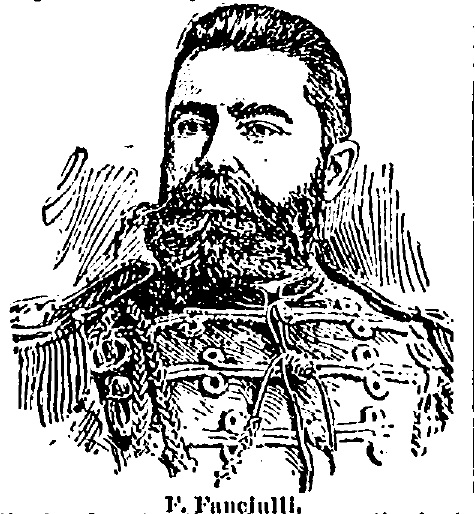What with it being Veterans Day, and thus time for a rerun, it is appropriate to celebrate the man who followed John Philip Sousa. So, once more, the story of Francisco Fanciulli.
When John Philip Sousa left the Marine band in 1892 to take up a position in Chicago, he left behind a great void. He had directed this group for 12 years at this point, and been a part of it since 1868, when he joined up at the tender age of 13 years. It fell to Prof. Franciso Fanciulli to take over the baton; he was given a five-year contract to do so. Fanciulli, originally from Italy, had emigrated to the US in 1876 at the age of 23. He originally came over to be a private music teacher, but had soon gone on to direct various orchestras. For most of Fanciulli’s term, all went well, with new marches being dedicated to him, and an unbroken stream of Marine Band concerts taking place at the Marine Barracks. This all changed on Decoration Day, 1897.
Fanciulli and his band were to lead the Marines from the Barracks to the corner of 15th and Pennsylvania Ave NW, from whence that day’s parade was to start. Fanciulli had his band playing marches that were not suitable to the usual pace of the Marines, so their leader, a Lieutenant Draper, sent an NCO to the head of the band, to request that the tempo be picked up. Fanciulli refused, and so Draper himself approached him after they had arrived at his destination. Once again, Fanciulli refused, saying “No, I prefer to select my own music.” With this, Draper placed Fanciulli under arrest, which in this case meant that the bandleader had to spend the night within the confines of the Marine Barracks, rather than returning to his home in the neighborhood. The lead cornetist took over the position at the front of the band, and the rest of the music played that day was, as Draper requested, “swinging.”
Fanciulli was charged with insubordination, and placed under arrest, though once again, this simply meant he could not leave the Barracks, and in fact was treated as an honored guest. The actual trial did not take long, though the verdict was not publicized for a number of days. The Washington Post nonetheless had to fill the space allotted to the trial with some words, and came up with this novel solution:
[Francis H. Harrington, commanding officer] testified to the general character of the accused, and stated further that he had always found him most willing, courteous and obliging. So it is with Heurich’s beer, it is courteous and obliging to the stomach and digestion. Had Lieuts Draper and Magill partaken of a cool and refreshing bottle of Heurich’s beer before starting for the Memorial Day exercises, there would have been no complaint made of the music rendered.
One hopes that Christian Heurich properly repaid this plug with a six-pack or two for the newspaperman who wrote it. Once the guilty verdict had been rendered, it was passed on to the Secretary of the Navy, in this case under-Secretary Theodore Roosevelt. Roosevelt determined that the sentence of immediate discharge was too harsh, and ordered him released from the Barracks. It was rumored that Fanciulli would immediately request a discharge, but rather he completed the last couple of months of service before retiring in November of 1897. Fanciulli therafter became the leader of the band of the 71st Regiment of the New York National Guard, and then later the Girl’s Concert Band. He died in New York City in 1915, having never regained the fame he had known as leader of the President’s Own Band.


